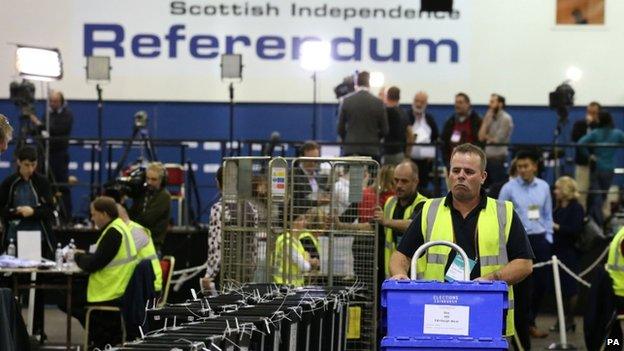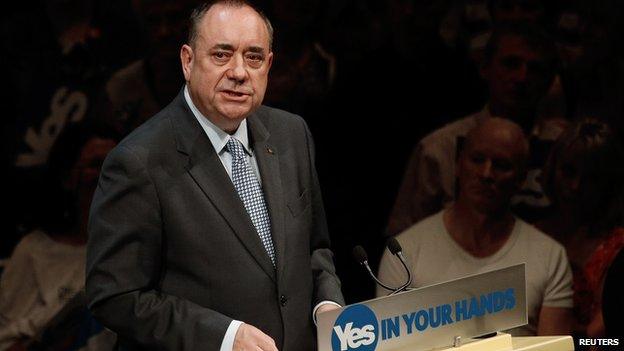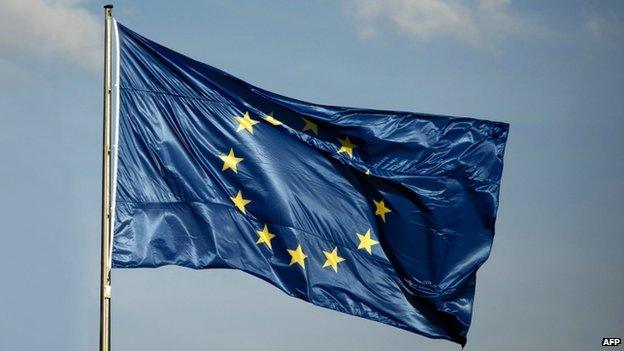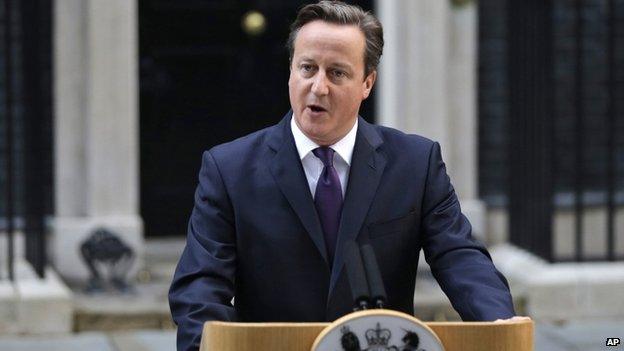Neverendum: 'Not at this stage'
- Published

So when is the next independence referendum? No, hang on. Stop whimpering like that. Bear with me. You may soon have withdrawal symptoms from the campaign, so why not plan for the next one?
After all, 1.6 million people wanted Scotland to be independent - the nationalists among them irreconcilable to UK citizenship, some of them newly and passionately mobilised to the cause.
They may be heart-sore at losing. It will hurt all the more to have seen the opinion polls narrow to a dead heat, with momentum apparently going their way, only to see a decisive result turn against them on the night.
But they're not going away. So what else would happen to their cause but a campaign for another referendum to give it another big heave?
Opportunity
No, hang on, I hear you say. Alex Salmond made it clear that this vote was "once in a generation", a rather vague measure of time which he later suggested could be 18 years - the gap between the 1979 and the 1997 referendums on home rule.
But he did that from a defensive position, which his party would later turn to its advantage.
Long before a referendum became likely, the criticism was that Scotland would be stuck in a Quebecois 'neverendum'.
His pledge was to avoid the impression that the SNP would keep demanding votes until it got its way, diverting politics from non-constitutional issues.

But towards the end of the campaign, that was turned into a 'One Opportunity' slogan, telling voters that they wouldn't get a second chance at a 'yes' vote, and asking how they could explain it to future generations if they didn't take this chance.
Now, the First Minister is saying no more referendums 'at this stage', which is another vague measure of time.
As a 'no' vote was long ago anticipated, the first minister's team were preparing how to use that leverage to lay claim, on 19 September, to the 'more devolved powers' movement.
That strategy hasn't worked out as expected, in that the pro-Union parties have suddenly, and hastily, rushed towards the prospect of much enhanced devolution to cover the other nations of the UK as well.
While the SNP licks its wounds, Labour and Conservative unionist die-hards are openly considering radical changes to the constitution, including federalism and some big shifts in tax and spending powers.
So it now seems the initiative is with the Westminster parties. Alex Salmond has sent them a clear message that they had better deliver on the expectations they've raised. Or...?
Grievance
That's where another referendum comes in. The SNP could run for office in 2016 with a pledge to hold a referendum again if devolution is judged not to be working as billed.
There are further reason that it might come about. With radical plans for more tax powers at Holyrood, and demands from other parts of the UK for a different distribution of funds, the case for retaining the Barnett Formula in recognisable form begins to unravel.
A reduction in block grant, which would be likely from a new needs-based assessment, could be a source of renewed grievance against Westminster.

And then there's Europe. If Conservatives hold a referendum on EU membership in 2017, as David Cameron has pledged, it could well pull the UK out. And if Scotland votes to stay in? Well, that's the kind of constitutional clash that could trigger another demand.
We don't know how it would be handled, but Henry McLeish, the former Labour First Minister, has today suggested that the other parts of a federalised UK could have a veto over England. In other words, the so-called Brexit referendum would have to be carried in all four parts.
Eton no more
But let's not get carried away. There are reasons why another referendum might be very hard to achieve.
The 2014 date with nationalist destiny relied on getting several ducks in a row. Three years ago, and to its own astonishment, the SNP won a majority of MSPs. And because of the voting system, its strategists don't have much expectation that it could win another.
It then had hard negotiating with Downing Street to get agreement on making the vote legal.

David Cameron is seen by many as having mishandled that - on letting Alex Salmond pick his timing, on refusing a 'devo max' option on the ballot paper, on the yes/no question putting the Union in a negative light. The SNP is unlikely to get that amount of leeway again.
And in a few years' time, it may be that the politics of Westminster has turned, with Etonians no longer in charge, the economy recovered and public spending no longer being squeezed.
None of these changes would help the case for independence, while the pro-Union side would have the opportunity to put together a more impressive, coherent and positive case next time.
What for?
There is another factor that nationalists have been talking about, which is a rather macabre analysis of the referendum result. It is that the decisive demographic group in the result was the over-65s. They preferred the union, and they're more likely to vote.
But it's indelicately pointed out that they're not going to be around forever, and they'll be replaced by younger generations who may have got a habit of supporting independence for Scotland.
But if there's not to be another referendum for the foreseeable future, there is a question the SNP now faces: what is it for? To run Holyrood's devolved powers better than others? Or to bide its time? It'll require skilful leadership to answer that question.
And that's just as the 'no' result has given those in favour of retaining the union a breathing space to answer a question that wasn't clearly answered in the campaign: what is the UK for?
NEWS UPDATE
Since filing this, Alex Salmond has announced he's stepping down as SNP leader and First Minister, once a successor is elected.
Asked about future strategy, he made clear to journalists that the "once in a generation" view was his and not a pledge which will bind his successor.
In saying the SNP will "hold Westminster's feet to the fire" on new powers for Holyrood, he left little doubt that this form of torture could well include the prospect of another referendum.
It came with a sting for his successor, whoever she may be - his observation that there's now a movement of 'Yessers' and other activists who are changing politics, and holding political leaders to account.